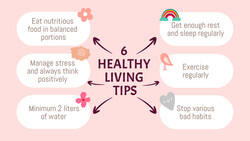A Fresh Start: Nurturing a Healthy Lifestyle in January

A Fresh Start: Navigating the Path to Wellness in the New Year
Greetings, students, parents, and faculty! As we step into January, I want to share some thoughts on the importance of embracing a healthy lifestyle for our high school community. As one of your school counselor, my goal is to support not only your academic endeavors but also your holistic well-being.
Creating a Culture of Wellness
High school is a dynamic time filled with academic challenges, extracurricular activities, and personal growth. It's crucial for our students to prioritize their health, both physical and mental, as they navigate these formative years. As we begin the new year, let's collectively foster a culture of wellness that encourages positive habits and self-care.
Nutrition for the Mind and Body
The journey to a healthy lifestyle starts with mindful choices, particularly when it comes to nutrition. Encourage balanced and nutritious meals that support sustained energy levels, focus, and overall well-being. As students, you have the opportunity to develop lifelong habits that contribute to your academic success and personal fulfillment.
Physical Activity: A Brain Booster
Research consistently shows the positive impact of physical activity on cognitive function and mental health. Whether through organized sports, regular exercise routines, or simply staying active throughout the day, students can enhance their ability to concentrate, manage stress, and cultivate a positive outlook.
Prioritizing Rest for Academic Success
In the fast-paced world of high school, it's easy to underestimate the importance of adequate sleep. As your counselor, I encourage you to prioritize quality rest. Establishing healthy sleep patterns contributes not only to improved academic performance but also to emotional resilience and overall well-being.
Hydration: Fuel for Learning
Staying hydrated is often overlooked but plays a crucial role in maintaining focus and concentration. Encourage students to carry water bottles and develop a habit of drinking water throughout the day. Small actions like this contribute to a healthy and energized learning environment.
Mindfulness and Stress Management
High school can be demanding, and stress is a natural part of the journey. Introducing mindfulness practices, such as deep breathing exercises or short meditation breaks, can equip students with valuable tools to manage stress and maintain a healthy balance.
Community Support and Open Conversations
As your counselor, my door is always open for students and parents alike. Let's foster a supportive community where open conversations about well-being are encouraged. Feel free to reach out if you need guidance or simply want to share your thoughts on navigating a healthy lifestyle.
Here's to a Year of Wellness and Growth!
Wishing each student a year filled with academic success, personal growth, and, most importantly, good health. Embrace the journey to wellness, and remember that small, consistent choices contribute to a vibrant and fulfilling high school experience.
Resource Roundup: Nurturing Well-Being- Food and your Mood
Discover these handpicked resources suitable for parents and students of all ages, designed to inspire a healthy lifestyle:
- https://www.sutterhealth.org/health/nutrition/eating-well-for-mental-health
- https://www.aetna.com/health-guide/food-affects-mental-health.html
For more resources, check out the Healthy Lifestyle page on the NLPS website.
Important Vitamins for Contributing to Positive Mental Health
Vitamin B1(thiamin) and mental health. Mental health problems such as memory loss, anxiety, depression, irritability, and insomnia are also associated with deficiencies in vitamin B1. The brain uses this vitamin to help convert glucose or blood sugar into energy. This means that without it, the brain may not have enough energy to function normally. Lack of enough vitamins may also lead to fatigue, loss of appetite, and gastrointestinal disorders.
Vitamin B12 and mental health. Vitamin B12 is a key component in the formation of red blood cells. Its deficiency could lead to an oxygen-transport problem in the blood known as pernicious anemia. This disorder may cause issues like mood swings, paranoia, irritability, confusion, dementia, and hallucinations (or mania).
Vitamin D and mental health. A deficiency has been associated with active mood disorder and depression. Further investigations point out that vitamin D is important and is used during brain development. Vitamin D can be gotten naturally from the sun, inadequacy of vitamin D has been positively linked to mental problems.
Reflecting on Last Month: Your Insights Matter!
In December, we celebrated the power of compassion. Share your experiences: How did our previous mental health blog post inspire acts of kindness? Your feedback and ideas are invaluable to us.
Nurturing a Healthy Lifestyle: Tips for Students
Students, let's embrace a vibrant life:
- Enjoy colorful fruits and veggies for a nutritious diet.
- Engage in physical activities you love every day.
- Create a calming bedtime routine for restful sleep.
- Practice gratitude for a positive mindset.
- Hydrate, breathe, and take breaks for self-care.
Connect with Our Student Advocacy Counsellors: Here for You
Need guidance or wish to discuss well-being? Our Student Advocacy Counselors are ready to help.
Our Counsellors are:
Erin MacDonald (A-K) erin.macdonald@nlsd.ab.ca
Kimberly Turchyn (L-M) kimberly.turchyn@nlsd.ab.ca
Reach out by email or call 780-639-0039.
Let's continue our journey of well-being and vitality together.
Here's to a January filled with vibrant health, joyful exercise, and peaceful sleep. Let's nurture a healthy lifestyle and embrace the year with vitality!
